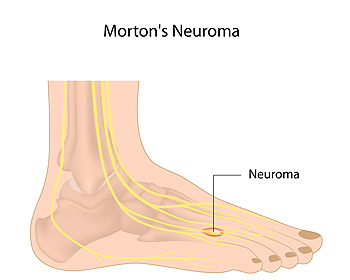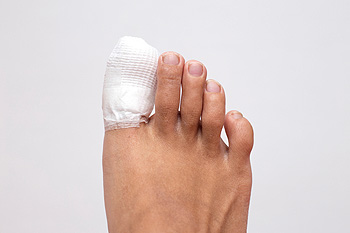Items filtered by date: February 2022
Toeing the Line on Toe Pain
The toes are instrumental in everyday movements like walking and running—not to mention athletic activities. Toes are therefore more susceptible to injury, which can result in pain. Toe pain can also be caused by a variety of factors including dysfunction in tissues, bones, nerves, skin, and other parts of the toes. It may also be the result of conditions such as hammertoe, arthritis (including gout), ingrown toenails, bunions, blisters, corns, calluses, tumors, infection, and inflammation (dactylitis). Pain in the toes can be accompanied by feelings of warmth, numbness, as well as other symptoms. If you are experiencing any of these symptoms in your toes, contact a podiatrist who will be able to discover the underlying cause of your toe pain and treat it accordingly.
Foot Pain
Foot pain can be extremely painful and debilitating. If you have a foot pain, consult with Gary Cockrell, DPM from Tennessee. Our doctor will assess your condition and provide you with quality foot and ankle treatment.
Causes
Foot pain is a very broad condition that could be caused by one or more ailments. The most common include:
- Bunions
- Hammertoes
- Plantar Fasciitis
- Bone Spurs
- Corns
- Tarsal Tunnel Syndrome
- Ingrown Toenails
- Arthritis (such as Gout, Rheumatoid, and Osteoarthritis)
- Flat Feet
- Injury (from stress fractures, broken toe, foot, ankle, Achilles tendon ruptures, and sprains)
- And more
Diagnosis
To figure out the cause of foot pain, podiatrists utilize several different methods. This can range from simple visual inspections and sensation tests to X-rays and MRI scans. Prior medical history, family medical history, and any recent physical traumatic events will all be taken into consideration for a proper diagnosis.
Treatment
Treatment depends upon the cause of the foot pain. Whether it is resting, staying off the foot, or having surgery; podiatrists have a number of treatment options available for foot pain.
If you have any questions, please feel free to contact our offices located in Brentwood and Madison, TN . We offer the newest diagnostic and treatment technologies for all your foot care needs.
Arthritis Can Cause Pain in the Feet and Ankles
What Is Hyperesthesia?
 Hyperesthesia refers to heightened sensitivity to stimulation and is a symptom of various nerve disorders. Morton’s neuroma, a thickening of the tissue around a nerve that leads to the toes, may cause hyperesthesia. This leads to pain, numbness, tingling, and burning in the toes and ball of the foot. Morton’s neuroma is often made worse by walking on hard surfaces or by wearing high heels or shoes that are tight in the toe area. The foot may also be tender. If you have pain in the balls and toes of your feet, it is strongly suggested that you seek the care of a podiatrist for a proper diagnosis and treatment.
Hyperesthesia refers to heightened sensitivity to stimulation and is a symptom of various nerve disorders. Morton’s neuroma, a thickening of the tissue around a nerve that leads to the toes, may cause hyperesthesia. This leads to pain, numbness, tingling, and burning in the toes and ball of the foot. Morton’s neuroma is often made worse by walking on hard surfaces or by wearing high heels or shoes that are tight in the toe area. The foot may also be tender. If you have pain in the balls and toes of your feet, it is strongly suggested that you seek the care of a podiatrist for a proper diagnosis and treatment.
Morton’s neuroma is a very uncomfortable condition to live with. If you think you have Morton’s neuroma, contact Gary Cockrell, DPM of Tennessee. Our doctor will attend to all of your foot care needs and answer any of your related questions.
Morton’s Neuroma
Morton's neuroma is a painful foot condition that commonly affects the areas between the second and third or third and fourth toe, although other areas of the foot are also susceptible. Morton’s neuroma is caused by an inflamed nerve in the foot that is being squeezed and aggravated by surrounding bones.
What Increases the Chances of Having Morton’s Neuroma?
- Ill-fitting high heels or shoes that add pressure to the toe or foot
- Jogging, running or any sport that involves constant impact to the foot
- Flat feet, bunions, and any other foot deformities
Morton’s neuroma is a very treatable condition. Orthotics and shoe inserts can often be used to alleviate the pain on the forefront of the feet. In more severe cases, corticosteroids can also be prescribed. In order to figure out the best treatment for your neuroma, it’s recommended to seek the care of a podiatrist who can diagnose your condition and provide different treatment options.
If you have any questions, please feel free to contact our offices located in Brentwood and Madison, TN . We offer the newest diagnostic and treatment technologies for all your foot care needs.
How the Feet Can Reveal Issues Throughout the Body
 There are a variety of health issues that can occur throughout the body that podiatrists are often the first to discover. This is because foot related issues can be an indicator of a more severe issue. For example, if your feet are too cold or turning blue, it can mean that there are issues with how the blood is circulating throughout the body. Diabetes is another condition that can affect the feet by causing wounds to heal slower. Heart disease or high blood pressure is another issue that can present itself in the feet by causing the feet to swell. Frequently occurring fungal nail infections can also indicate an auto-immune disorder or a weakened immune system. Patients who notice anything unusual with their feet should visit with a podiatrist to have the issue examined.
There are a variety of health issues that can occur throughout the body that podiatrists are often the first to discover. This is because foot related issues can be an indicator of a more severe issue. For example, if your feet are too cold or turning blue, it can mean that there are issues with how the blood is circulating throughout the body. Diabetes is another condition that can affect the feet by causing wounds to heal slower. Heart disease or high blood pressure is another issue that can present itself in the feet by causing the feet to swell. Frequently occurring fungal nail infections can also indicate an auto-immune disorder or a weakened immune system. Patients who notice anything unusual with their feet should visit with a podiatrist to have the issue examined.
When dealing with systemic disease of the feet, it is extremely important to check the affected areas routinely so that any additional problems are caught quickly. If you have any concerns about your feet and ankles contact Gary Cockrell, DPM from Tennessee. Our doctor will assist you with all of your podiatric needs.
Systemic Diseases of the Feet
Systemic diseases affect the whole body, and symptoms usually are displayed in the feet. This condition can make a patient’s ability to walk unbearable. Systemic diseases include gout, diabetes mellitus, neurological disorders, and arthritis.
Gout – is caused by an excess of uric acid in the body. Common symptoms include pain, inflammation, and redness at the metatarsal/phalangeal joint of the base big toe. Gout can be treated by NSAIDs to relieve pain and inflammation, and other drugs that lower the acid levels in the body.
Diabetes mellitus – is an increase in the level of blood sugar that the body cannot counteract with its own insulin. Failure to produce enough insulin is a factor in Diabetes.
Diabetes of the Feet
Diabetic Neuropathy – may lead to damaged nerves and affect the feet through numbness and loss of sensation.
Peripheral Vascular Disease – can restrict the blood flow to the feet, and often times lead to amputation of the feet.
If you have any questions please feel free to contact our offices located in Brentwood and Madison, TN . We offer the newest diagnostic and treatment technologies for all your foot and ankle needs.
Everything You Wanted to Know About Ingrown Toenails
An ingrown toenail occurs when the nail grows into the surrounding skin on the sides of the nail. This condition can affect people of all ages (even babies). Ingrown toenails can be quite painful and may even become inflamed and infected. Rounding your toenails off when trimming them (rather than cutting them straight across) or cutting them too short can lead to an ingrown toenail. Wearing high heels and improperly fitted shoes that force the toes to squish together can also lead to ingrown toenails. Other possible contributing factors to ingrown toenails include injuries to the toenail, fungal toenail infections, nail deformity, and certain medications which can sometimes cause nail dystrophy. If you develop an ingrown toenail, make an appointment with a podiatrist who can treat your ingrown toenail with a variety of methods, while avoiding possible infection and preventing it from becoming ingrown again.
Ingrown toenails can become painful if they are not treated properly. For more information about ingrown toenails, contact Gary Cockrell, DPM of Tennessee. Our doctor can provide the care you need to keep you pain-free and on your feet.
Ingrown Toenails
Ingrown toenails occur when a toenail grows sideways into the bed of the nail, causing pain, swelling, and possibly infection.
Causes
- Bacterial infections
- Improper nail cutting such as cutting it too short or not straight across
- Trauma to the toe, such as stubbing, which causes the nail to grow back irregularly
- Ill-fitting shoes that bunch the toes too close together
- Genetic predisposition
Prevention
Because ingrown toenails are not something found outside of shoe-wearing cultures, going barefoot as often as possible will decrease the likeliness of developing ingrown toenails. Wearing proper fitting shoes and using proper cutting techniques will also help decrease your risk of developing ingrown toenails.
Treatment
Ingrown toenails are a very treatable foot condition. In minor cases, soaking the affected area in salt or antibacterial soaps will not only help with the ingrown nail itself, but also help prevent any infections from occurring. In more severe cases, surgery is an option. In either case, speaking to your podiatrist about this condition will help you get a better understanding of specific treatment options that are right for you.
If you have any questions please feel free to contact our offices located in Brentwood and Madison, TN . We offer the newest diagnostic and treatment technologies for all your foot and ankle needs.



